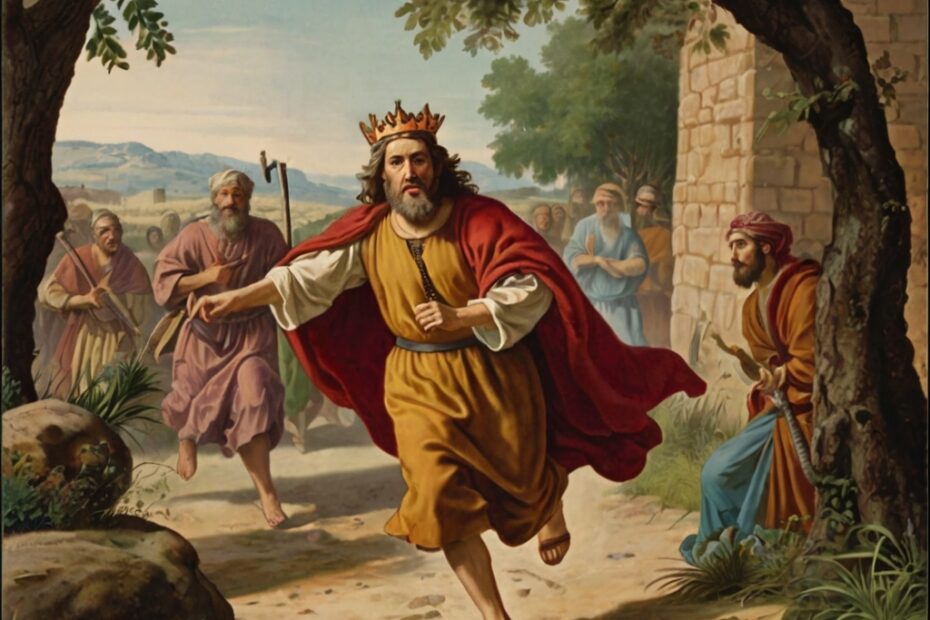King David’s career as a king was marked by illustrious achievements, but his life as a father was unfortunately spotted by many heartaches and disappointments.
His son Amnon became obsessed with Absalom’s sister, Tamar, and manipulated the situation to rape her. Absalom was incensed but he neither said nor did anything to Amnon until two years later when he cooked up a scheme to exact revenge on Amnon.
To execute his evil plan, he invited his father and all his brothers to his sheepshearing feast. King David declined the invitation but he permitted all his children to attend. Absalom instructed his men to kill Amnon when after Amnon becomes drunk. Once Amnon was killed, Absalom fled to his grandfather Talmai in Geshur, where he stayed for three years.
Back in Jerusalem, news arrived that Absalom had killed all his other sons. In an act of grief, sorrow and mourning, David and his servants tore their clothes, and David lay on the ground while the servant stood by. Fortunately, all his other children returned to David. They went back weeping and wailing, greeted by King David and servants, who wept bitterly with the King David’s children.
Imagine the emotional roller-coaster that King David went through. Upon receiving the news that all his children had, he was plunged deep into the depths of sorrow and remorse. If all of them had truly died, he would have been the one who sent them to their deaths. When they came back alive, King David must have been relieved and overjoyed, but he still had to deal with the death of his son Amnon and the splintering of his family.
It is sad losing a son, but how do you hate your own son? David must have been angry and disappointed in Absalom, but he also could not help missing Absalom dearly. However, the inner conflicts he was struggling with did not allow him go to Absalom.
Joab, David’s nephew and a commander in the army, knew that David longed to see Absalom and helped David to overcome his internal struggles. Joab brought Absalom back to Jerusalem but David refused to meet Absalom, so Absalom spent two years in Jerusalem without meeting the king. Absalom grew increasingly frustrated and wanted Joab to bring him to the king, but even Joab refused to meet Absalom. Eventually, Absalom managed to get Joab to meet him by burning Joab’s field, and Joab arranged for Absalom and David’s reunion, which ended with David kissing Absalom.
Over the next four years, Absalom orchestrated his rebellion by strategically winning the hearts of those who harboured grievances. First, he gave them the impression that King David would not would give them a fair hearing or a just outcome. Then he told them how they would get justice if he were the judge. In doing so, he won over many supporters.
Once Absalom felt the time was ripe, he asked King David for permission to go to Hebron to fulfill a vow that he had made while he was in Geshur. Absalom declared himself king over Israel once he arrived in Hebron. Support for Absalom continued to grow, and even David’s advisor, Ahitophel the Gilonite defected and joined Absalom in Hebron.
When David found out that Absalom had won the hearts of the men of Israel, he fled the palace with his men. After David left Jerusalem, Absalom returned to the city, where he took control of the capital.
For David and his men, the journey to Mahanaim was arduous, both physically and emotionally. As they were marching towards the wilderness, the whole countryside wept aloud. It was not stated, but many of David’s men, and even David himself, may have been crying as well.
Later, as they were climbing up the Mount of Olives, David and his men covered their heads and and wept. David himself even went barefoot. All these were expressions of their extreme grief and sorrow, deep mourning, humiliation, distress, despair and even repentance.
As he was running away from Jerusalem, David must have been wrestling with his betrayal by his son and the loss of his kingdom, all while fearing for his life. And I imagine that the rape of Tamar and the death of Amnon would also have added to his emotional burdens, spiralling him deeper into emotional and spiritual turmoil.
Meanwhile, upon the advice of Hushai, Absalom led the entire army of Israel to pursue David with the objective of exterminating David and all his men. On the other camp, David’s one instruction was for the men to deal gently with his son Absalom. Unfortunately, Joab went against David’s instruction and killed Absalom.
As the messengers were running back to report on the outcome of the battle, we see David sitting between the inner and outer gates in the city wall. We do not know how long the battle lasted, but I imagine he might have been sitting there for as long as the battle lasted. When the messengers went back to report that they had won the battle, all David wanted to know was whether Absalom was alright. When he realised Absalom was dead, he wept bitterly and wished he were dead instead.
It was a conclusive victory for King David, and it should have been a day of celebration, but it became a day of mourning because King David was grieving over the death of his son Absalom.
Psalms 3 and 4 were written during the time when he was running away from Absalom. I hope this write-up
